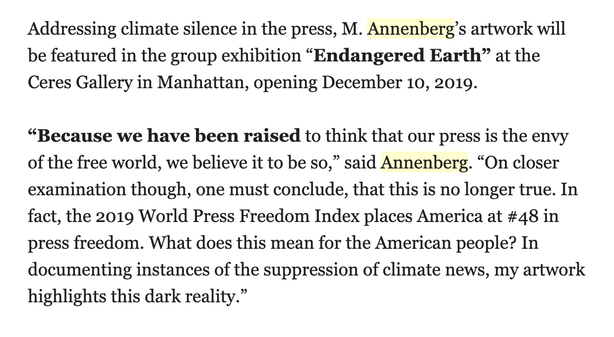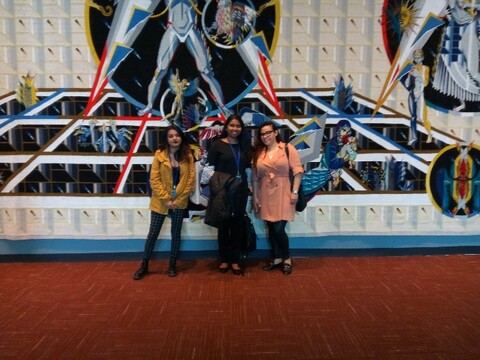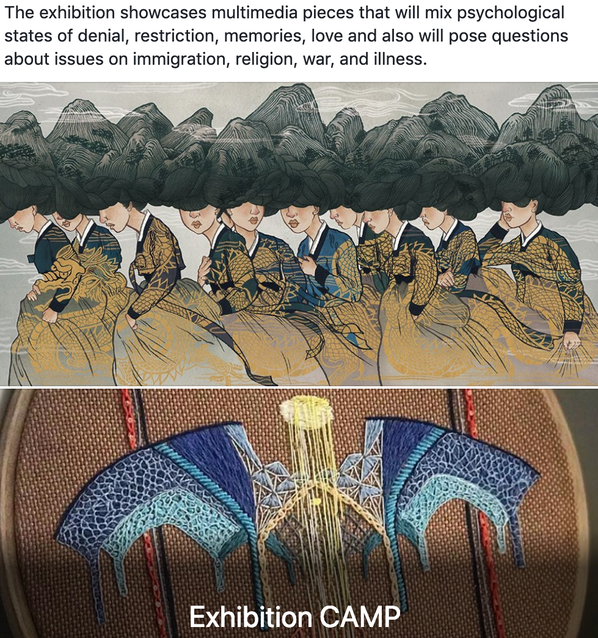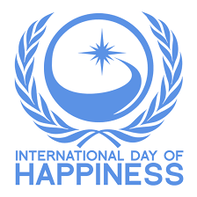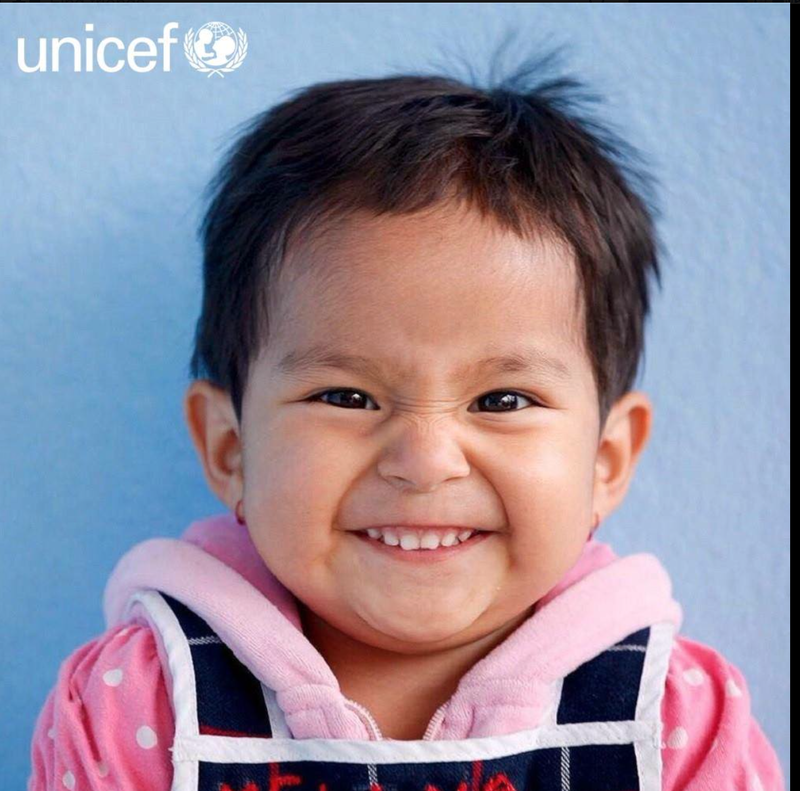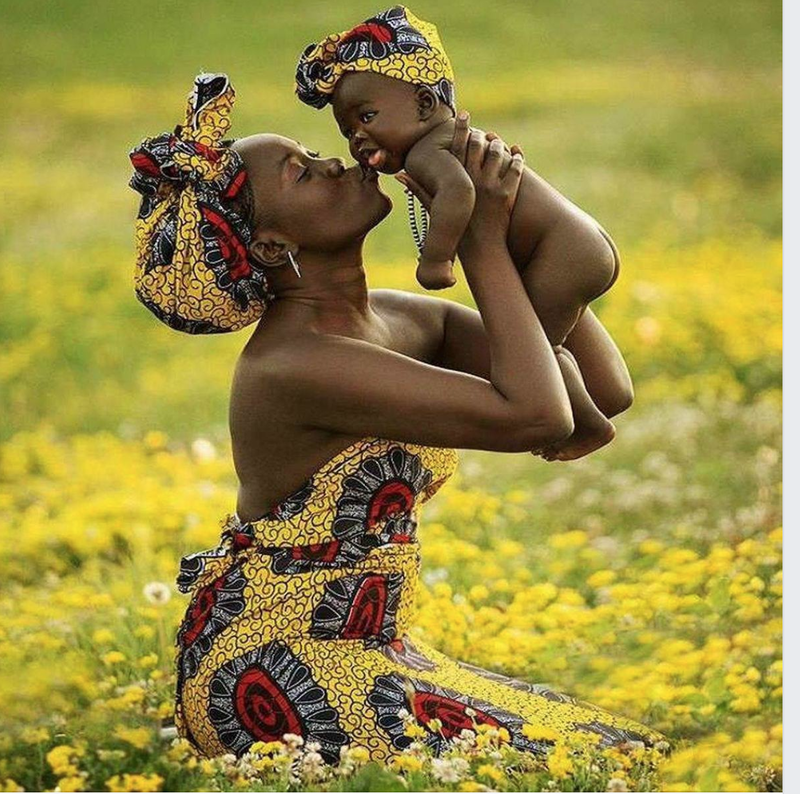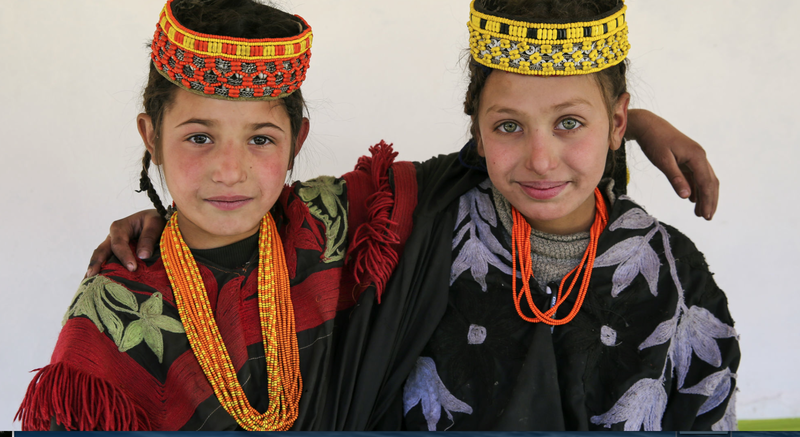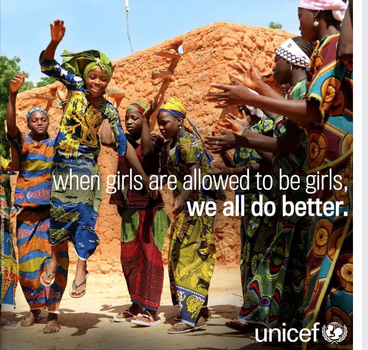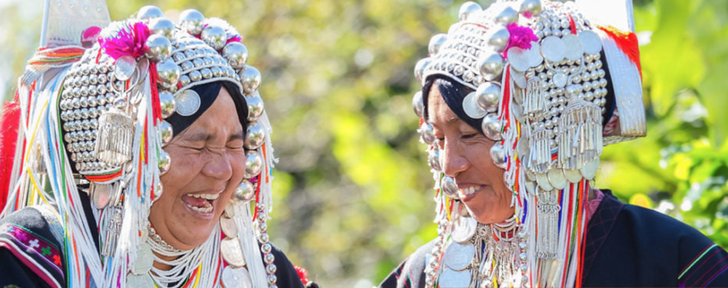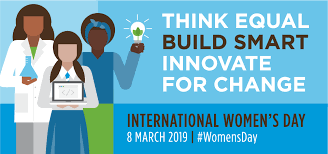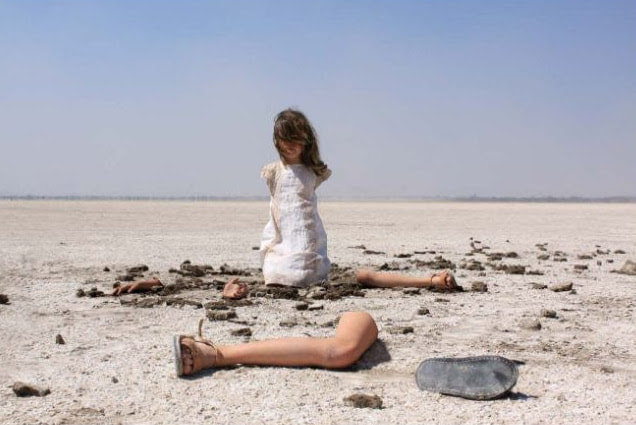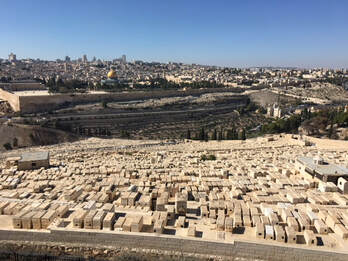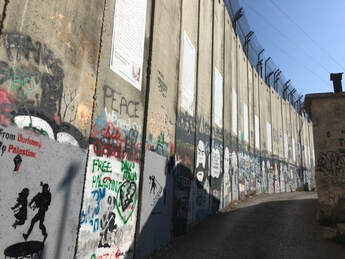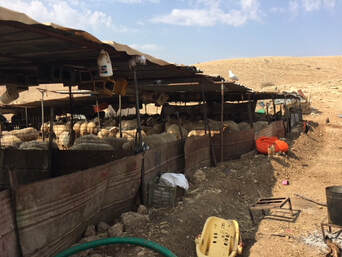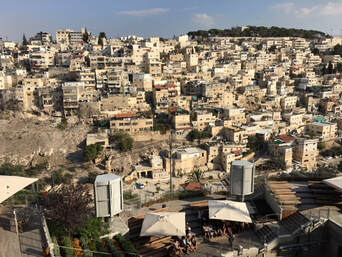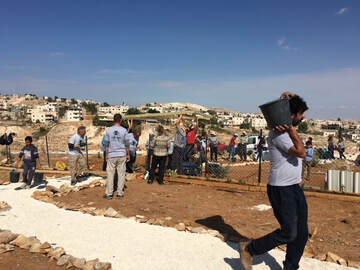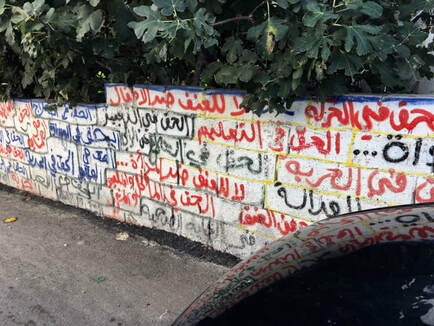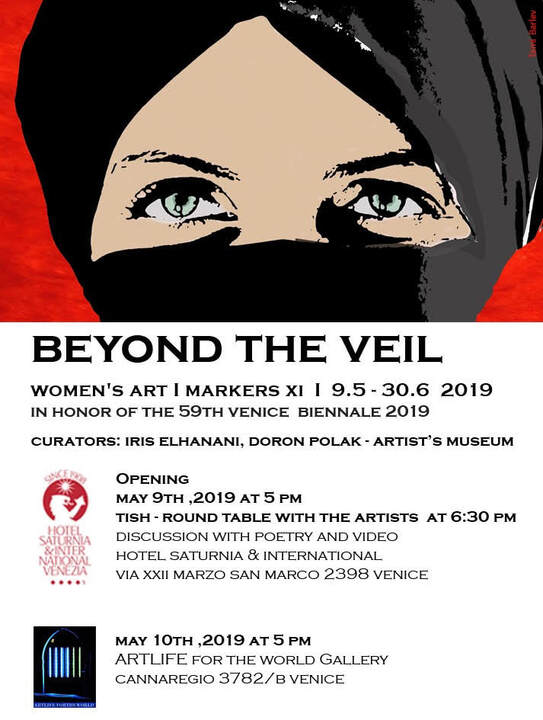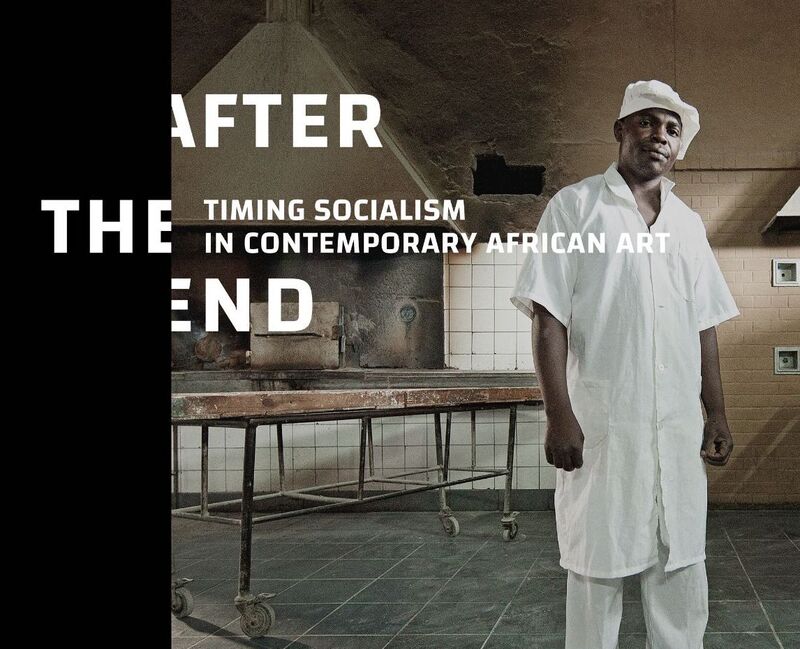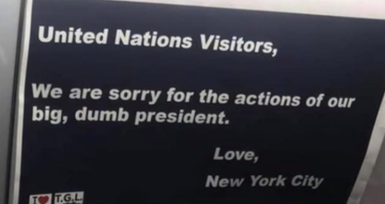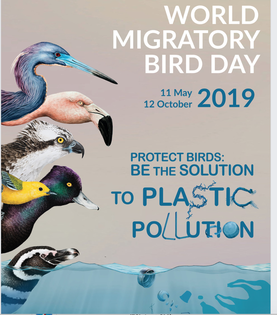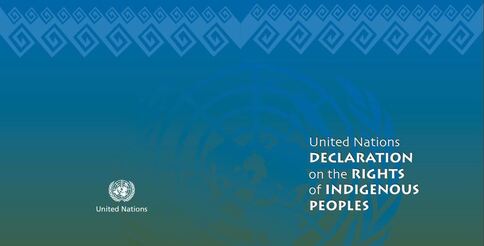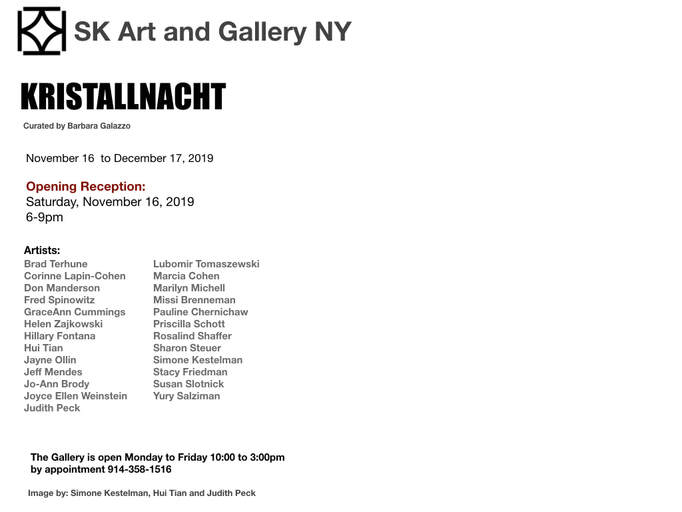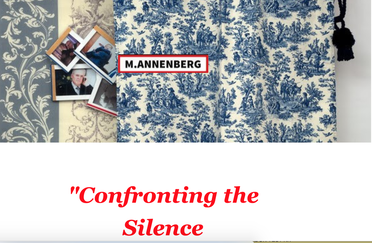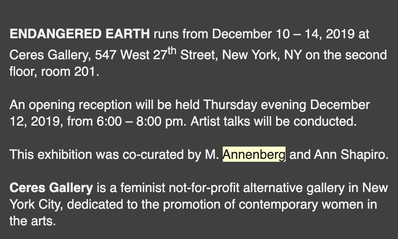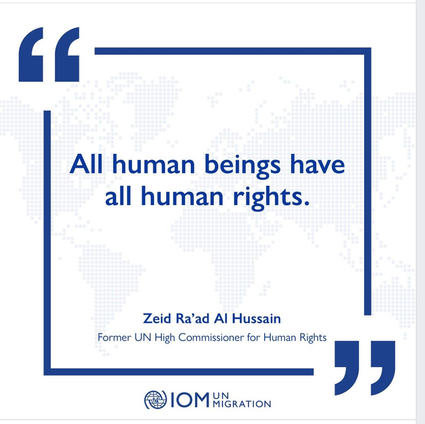UN Program Director News and Updates 2019
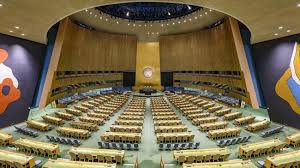 UN photo
UN photo
Once again, we here at the UN Program look forward to another year of stimulating, educating, and engaging activities. I have begun sharing information of our activist artists and the projects they are developing which support UN platforms. This initiative has been enthusiastically received, so I will continue with this as a new element of our announcements. I am extremely proud of our divergent group of committed individuals and world class talents.
As always, I send warmest wishes to our members and I look forward to another productive year with you.
Maureen Burns-Bowie
Director
As always, I send warmest wishes to our members and I look forward to another productive year with you.
Maureen Burns-Bowie
Director
__________________________________
UPDATE #1
Liz DiGiorgio Welcomes Three New Youths to the UN Program
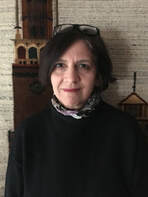
_______
Liz DiGiorgio, the Women's Caucus for Art/UN Program Director of United Nations Youth Representatives is welcoming three new young women to the CUNY program. Liz works tirelessly as a mentor, and each year we have a new group who report back to us how much their lives have been changed by participation in this venerable institution. We are always so proud of our students. Below are their impressive essays.
______________________________________________________________________
Liz DiGiorgio, the Women's Caucus for Art/UN Program Director of United Nations Youth Representatives is welcoming three new young women to the CUNY program. Liz works tirelessly as a mentor, and each year we have a new group who report back to us how much their lives have been changed by participation in this venerable institution. We are always so proud of our students. Below are their impressive essays.
______________________________________________________________________
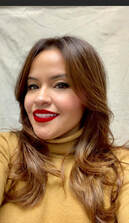
Diane Cadena
My name is Diane Cadena and I would like to be a representative for the Women’s Caucus for Art at the United Nations because making a difference is crucial to me. I believe and value the Sustainable Development Goals, especially Number 3: Good Health and Well-being, as well as Number 6: Clean Water and Sanitation. Finding solutions to keep our water systems clean prevents premature diseases and deaths. Prolonged good health enables families to have a good quality of life because it allows people to work and support their families. Clean water is essential for growing crops and preventing hunger. The Sustainable Development Goals will only lead to a domino effect of positive outcomes.
This past summer I worked with the CUNY Service Corps with its New York Stands with Puerto Rico Recovery and Rebuilding Effort. During my service, I truly realized that you need to get up and get physically involved in order to make a difference. In Puerto Rico I worked with other CUNY students to restore the lives of those affected by Hurricane Maria by building new homes. This experience gave me a fuller understanding of Sustainable Development Goal Number 13: Take Urgent Action to Combat Climate Change and its Impacts. Our goal as a group was to first make our presence known when we got there, and to let the homeowners know that we were there to help. Our next step was to find out more about the homeowners because some of them were elderly and really had no one to talk to. They shared their experiences and beautiful stories of their childhoods in the town of Vietnam just south of San Juan, Puerto Rico. After hearing all the stories, we realized we wanted to do more, and we went around and made sure that we got everyone on the entire block signed up so that they could get some assistance and get the life they had back. We were determined to leave no one behind.
The members of the Woman’s Caucus for Art have played a major role in working for equality and providing opportunities for women to voice global concerns through art. I would love the opportunity to learn more about the initiatives of the Women’s Caucus for Art and to learn more about how it supports the Sustainable Development Goals and the work of the UN.
______________________________________________________________________
Diane Cadena
My name is Diane Cadena and I would like to be a representative for the Women’s Caucus for Art at the United Nations because making a difference is crucial to me. I believe and value the Sustainable Development Goals, especially Number 3: Good Health and Well-being, as well as Number 6: Clean Water and Sanitation. Finding solutions to keep our water systems clean prevents premature diseases and deaths. Prolonged good health enables families to have a good quality of life because it allows people to work and support their families. Clean water is essential for growing crops and preventing hunger. The Sustainable Development Goals will only lead to a domino effect of positive outcomes.
This past summer I worked with the CUNY Service Corps with its New York Stands with Puerto Rico Recovery and Rebuilding Effort. During my service, I truly realized that you need to get up and get physically involved in order to make a difference. In Puerto Rico I worked with other CUNY students to restore the lives of those affected by Hurricane Maria by building new homes. This experience gave me a fuller understanding of Sustainable Development Goal Number 13: Take Urgent Action to Combat Climate Change and its Impacts. Our goal as a group was to first make our presence known when we got there, and to let the homeowners know that we were there to help. Our next step was to find out more about the homeowners because some of them were elderly and really had no one to talk to. They shared their experiences and beautiful stories of their childhoods in the town of Vietnam just south of San Juan, Puerto Rico. After hearing all the stories, we realized we wanted to do more, and we went around and made sure that we got everyone on the entire block signed up so that they could get some assistance and get the life they had back. We were determined to leave no one behind.
The members of the Woman’s Caucus for Art have played a major role in working for equality and providing opportunities for women to voice global concerns through art. I would love the opportunity to learn more about the initiatives of the Women’s Caucus for Art and to learn more about how it supports the Sustainable Development Goals and the work of the UN.
______________________________________________________________________
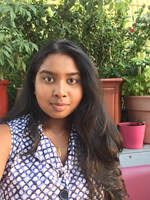
Shristi Sookram
My name is Shristi Sookram. I was born on the scenic and beautiful island of Trinidad. My family and I immigrated to the United States when I was five years of age. We came to the “land of opportunity” in pursuit of a better quality of life. For as long as I can remember, my dream has always been to help other people. It was instilled in me that my purpose in life is something bigger than myself and more about the people around me. As I started to get older, I realized that I needed to aspire to a job that combined my passions for helping those underrepresented and my strengths, which are writing and speaking. Human rights law became the obvious choice for me.
I still remember being 11 years old in middle school and hearing about this young girl who had survived a bullet to the head while going to school. I remember the outrage I felt at the thought of a girl who simply exercised her right to acquire knowledge being oppressed by those who thought a girl’s education was a threat to their power. I understood the importance of education, especially for girls, and the role it would play later on in her life. That girl would serve as my daily reminder that there was work to be done in the world. Her name is Malala Yousafzai. She inspired an entire generation and reminded us that education and opportunity are something to fight for, and that they should be accessible to everyone. I'm particularly passionate about women's issues in the human rights sector. Our sisters all around the world are being denied opportunities, education and the fundamental right to voice themselves as human beings. When I think about other young women my age who are subjected to early marriage at a young age, denied post-secondary education, shamed for simply expressing their feelings and many other forms of oppression that women face, it validates the work that I know I need to do professionally.
This internship would allow me to put my feet on the ground in a place that I have regarded as holding a very high standard when it comes to fighting injustice; a place that stands for the very values and principles that I hold dear. The Women's Caucus for Arts is an organization that would allow me to engage in a once -in- a- lifetime opportunity. This organization combines two of my passions, art and human rights, into an internship that I could only have dreamt of.
I am also an independent artist and express myself through paintings that I deem near and close to my heart. The value art has had on my life in unexplainable and spiritual for me. It's a journey that takes me closer to myself. This internship would allow me to further explore and grow into someone more insightful, just by even being in a room with people whom I aspire to emulate. At the core of my beliefs, are justice and peace, two things I want to fight for. As Nelson Mandela once said, “To deny people their human rights is to challenge their very humanity.”
______________________________________________________________________
My name is Shristi Sookram. I was born on the scenic and beautiful island of Trinidad. My family and I immigrated to the United States when I was five years of age. We came to the “land of opportunity” in pursuit of a better quality of life. For as long as I can remember, my dream has always been to help other people. It was instilled in me that my purpose in life is something bigger than myself and more about the people around me. As I started to get older, I realized that I needed to aspire to a job that combined my passions for helping those underrepresented and my strengths, which are writing and speaking. Human rights law became the obvious choice for me.
I still remember being 11 years old in middle school and hearing about this young girl who had survived a bullet to the head while going to school. I remember the outrage I felt at the thought of a girl who simply exercised her right to acquire knowledge being oppressed by those who thought a girl’s education was a threat to their power. I understood the importance of education, especially for girls, and the role it would play later on in her life. That girl would serve as my daily reminder that there was work to be done in the world. Her name is Malala Yousafzai. She inspired an entire generation and reminded us that education and opportunity are something to fight for, and that they should be accessible to everyone. I'm particularly passionate about women's issues in the human rights sector. Our sisters all around the world are being denied opportunities, education and the fundamental right to voice themselves as human beings. When I think about other young women my age who are subjected to early marriage at a young age, denied post-secondary education, shamed for simply expressing their feelings and many other forms of oppression that women face, it validates the work that I know I need to do professionally.
This internship would allow me to put my feet on the ground in a place that I have regarded as holding a very high standard when it comes to fighting injustice; a place that stands for the very values and principles that I hold dear. The Women's Caucus for Arts is an organization that would allow me to engage in a once -in- a- lifetime opportunity. This organization combines two of my passions, art and human rights, into an internship that I could only have dreamt of.
I am also an independent artist and express myself through paintings that I deem near and close to my heart. The value art has had on my life in unexplainable and spiritual for me. It's a journey that takes me closer to myself. This internship would allow me to further explore and grow into someone more insightful, just by even being in a room with people whom I aspire to emulate. At the core of my beliefs, are justice and peace, two things I want to fight for. As Nelson Mandela once said, “To deny people their human rights is to challenge their very humanity.”
______________________________________________________________________
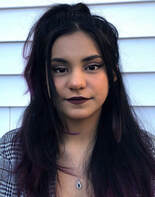
Yaritza Bustamante
Mental health issues have affected many people around the world, and recently it has been an issue that the United Nations has taken notice of. This past May, at a roundtable discussion with the World Health Organization and the Wellcome Trust (a foundation that supports scientists and research), Secretary-General António Guterres stated that, “The UN is committed to working with partners to promote full mental health and wellbeing for all” (United Nations). The United Nations has a set goal for the 2030 Sustainable Development Agenda to tackle mental health problems and find creative solutions. When I read about this, I knew that I wanted to be a part of the Women’s Caucus for Art and help represent women at the United Nations. According to the World Health Organization, “Depressive disorders account for close to 41.9% of disability from neuropsychiatric disorders among women compared to 29.3% among men” (World Health Organization). This is a big difference between the genders. As reported by the World Health Organization, the leading mental health problems of the older adults are depression, organic brain syndromes and dementias, and women comprise the majority of those suffering from these problems (World Health Organization). I want to know why the majority are women and what can we do to help prevent this for both men and women. The roundtable discussion also included Deputy Secretary-General Amina Mohammed, who pointed out that, “mental health is not just an issue for the health sector because it also related to equality and basic individual rights.”
Like the world leaders at the United Nations, I am interested in helping to find creative solutions for everyday life problems. I believe that making art is an important component of wellbeing and mental health, and an important way to address pressing problems. This is why I created the Artists and Designers Development Club on campus along with fellow art students. Our Club allows artists to interact with each other in and outside of the class environment. It includes painters, photographers, animators and many more in one club. Students have told me that they love the Club because it was the first time that they’ve felt included. The students also reported that they gained new inspiration from each other and that the Club led them to collaborate on independent projects with other members. This is something that made me proud and inspired me to keep the Club going. I am studying to be an animator, and this has been my dream career. I’m always looking for new ideas, new opinions and new inspirations. My experience working in architectural firms and doing graphic design work has allowed me to see different perspectives through different types of art. I look forward to attending UN DPINGO briefings, gaining knowledge of global issues, new perspectives and new inspirations.
Works Cited:
United Nations, “Mental health ‘neglected issues’ but key to achieving Global Goals, say UN chiefs” UN News, Health, May 2018, www. news.un.org/en/story/2018/05/1008822
World Health Organization, “Mental Health, Gender and Mental Health” 2018, www.who.int/mental_health/prevention/genderwomen/en/
World Health Organization, “Depression” 2019, www.who.int/news-room/fact-sheets/detail/mental-disorders
_______________________________________________________________________
_______________________________
UPDATE #2
SUSTAINABLE DEVELOPMENT GOALS
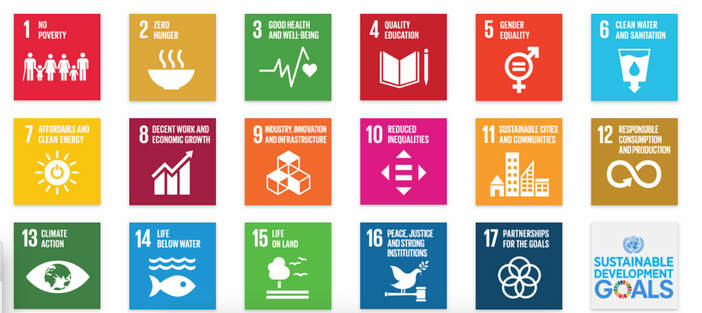
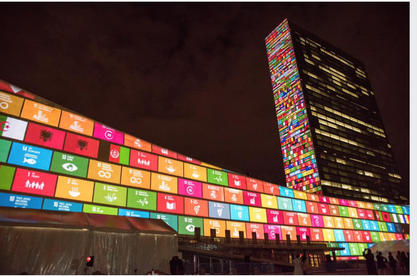 UN News
UN News
UNITED NATIONS HEADQUARTERS NYC
_______________________________
UPDATE #3
"A Matter of Humanity: The Rescue of Jews in Albania During the Holocaust"
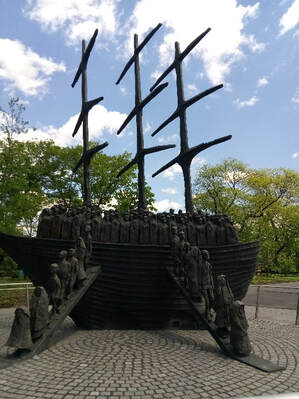 PHOTO: Diane Cadena
PHOTO: Diane Cadena
-Diana Cadena
The Holocaust is a topic that young people shy away from because of the minimal amount of information they have about it. With so many of the survivors passing away due to advanced age, there are now very few survivors left. It is therefore more important than ever that we continue to spread the word and keep letting people know about what happened. In the briefing entitled “A Matter of Humanity,” Ms. Besiana Kadare spoke about how Albania was the only country that had ten times more Jews after the end of the war than at the beginning. It was astonishing to learn that the Jewish population of a country under occupation by Axis forces could be protected during a period when the Nazis were carrying out genocide throughout Europe. According to Ms. Kadare, there was not a single case where an Albanian turned in a Jew to the Nazis. Jews found safe refuge in Albania because the Albanian authorities refused to provide a list of Jews. The Albanian Embassy in Berlin granted visas to Jews from any country at a time when few other countries would allow them to enter. The explanation for this remarkable situation is attributed to the Albanian ethical code of honor, known as the Besa, which is the promise to never betray your guest or your neighbor. This code meant that there were no foreigners in Albania, there were only guests. “Our moral code as Albanians require that we be hospitable to our guests in our home and in our country.” When asked about the possibility of Albanians reporting the presence of the Jews to the Nazis, Ms. Kadare responded that, while such a thing was a possibility “if an Albanian did this he would have disgraced his village and his family. At a minimum his home would be destroyed and his family banished.”
Ronald Lauder, President of the World Jewish Congress, stated that Albanians are exceptional because of the rarity at the time in finding countries to actually assist in helping the Jews when so much of the world was indifferent. Albania stood out among nations and showed tremendous courage. The importance of showing leadership and standing up for what's right is so important. The fact that an entire country had been able to stand up and make it something they live by as a nation should be proof that we, as individuals, can make a monumental change when we stand up for human rights and the right for people to live freely.
________________________________________________________
Yaritza Bustamante
The briefing entitled “A Matter of Humanity: The Rescue of Jews in Albania During the Holocaust” was beautifully organized with speakers who approached the subject from a variety of experiences. When I first heard the title of this briefing, I was immediately interested in it. It was the first time I had heard about Albania helping Jews during the Holocaust. It is something that I never heard about in my history classes throughout my time in grade school and high school. I loved the fact that the United Nations devoted time to acknowledge tremendous acts of kindness during a dark time.
The briefing panel included wonderfully articulate speakers, including Besiana Kadare, Permanent Representative of the Foreign Ministry of Albania to the United Nations; Ambassador Ronald Lauder, President of the World Jewish Congress; Prof. Shaban Sinani, historian and author of the book “Albanians and Jews: The Protection and Salvation”; Dr. Anna Kohen, whose family was rescued in Albania during the Holocaust and Mr. David Estrin, Founder of the youth organization “Together We Remember.” All of the panelists had thought-provoking and inspiring presentations, but the speaker that caught my attention the most was Mr. David Estrin. In the beginning of his speech, he tried his best to give us a visualization of what his grandparents went through during the war as resistance fighters. He realized that he had to keep his grandfather’s legacy and his history present. He reminded us that the war was only 74 years ago, and we should never forget the Holocaust or any genocide. This was why he founded the organization “Together We Remember.” In April of 2012, he organized and coordinated a remembrance vigil on his college campus on Holocaust Remembrance Day, however, he expanded the concept of “Never Again” to include all victims of genocide throughout history. In the years that followed, “Together We Remember” organized vigils, art performances, and programming around the world that occur annually during April, which is Genocide Remembrance and Prevention Month. His organization maintains a database of the names of victims of genocide, and these names are read at vigils around the world. Through his organization, David Estrin was doing what Ambassador Kadare meant when she said, “Future generations must be taught to always take sides and stand apart against hate and racism.”
Because there was so much information each speaker wanted to tell the audience, there was no time for questions between the audience and speakers. The audience members were very much engaged by the speakers and the information and stories that they were given. You could feel how proud and grateful the speakers were when they spoke on Albania helping the Jewish community when they needed it most.
_______________________________
UPDATE #4
NATALIE BURLUTSKAYA AND GALLERY MC PRESENT "CAMP"
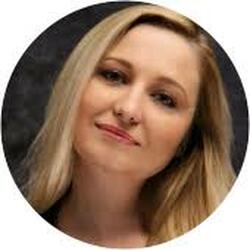
POP UP SHOW
MARCH 13, 14
545 WEST 52 STREET
NEW YORK, NEW YORK
______________________________
UPDATE #5
UNITED NATIONS INTERNATIONAL DAY OF HAPPINESS
_______________________________
UPDATE # 6
UN Program Members at United Nations
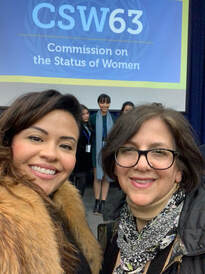
Diane Cadena (L) and Liz DiGiorgio (R), WCA/UN Program Representatives to the United Nations attended the UN Women's Commission on the Status of Women Conference in NYC . CSW is the largest women's advocacy organization in the world, and sponsors yearly programs for activists who are committed to empowering women and setting new global standards for gender equality. This conference is held every March in NYC and all WCA members are eligible to attend.
Diane Cadena Report:
It was a great honor to attend a gathering with such incredible young women. The CSW session about the work of Girls Learn International was sponsored by the Feminist Majority Foundation, and focused on the topic of Girls’ Political Empowerment. It was so incredibly enlightening and gratifying to see the next generation’s interest in issues related to gender and politics. The students came from completely different backgrounds, but they all had been trying to make a difference in their communities and their respective campuses. For example, Simran Shrestha, who is only 19 years old and attends college in Virginia, was able to join a program that focused on public speaking. She had a strong interest in the political empowerment of women in her home country of Nepal. Simran focused on advocacy, and spoke of Woman Lead and how they were a pivotal factor in her decision to take an interest in the world. She was adamant in her belief that the lack of woman in political roles is something that needs to be changed. She discussed how the lack of women in politics hampers how laws and policies are made. Her research dealt mainly with how important it was for women to be involved in politics, and how this would change things for the better for women. She cited family-related responsibilities as the main factor preventing young women from participating in political life.
May Li, from Girls Learn, emphasized the importance of being assertive, regardless of whether you are liked or not. I thought that she was brave for standing up for what she believed in, regardless of whether others agreed with her or not. Most people, especially young students, don’t want to stand out as that often leads to being bullied. Her bravery helped other students feel comfortable with standing up and joining her lead. Sagoon Bhetwal was also a guest speaker with a strong dedication to eventually running for political office. As a child she had the urge within to stand up for what she believed in. She will continue to pursue her childhood dream of running for office. The one student who really stood out to me was Magdalena Tesha from Tanzania. She was only 15 years old and had traveled all the way from Africa to present to us here in New York. She said that just having a piece of paper and a pen was an enormous privilege where she came from. The harsh truth is that in Tanzania some young ladies become pregnant at a very young age, and it changes them by bringing new responsibilities that do not allow them to excel in school. School becomes something that is unattainable and just a distant dream. Females who avoided getting pregnant still face other challenges, such as a lack of transportation to school or the lack of infrastructure in itself. There were very few areas that even had schools at all. Magdalena Tesha has taken on the incredible task of trying to go back to Tanzania and fight for ways to bring change so that more girls can have the chance that she didn’t have.
The session concluded with Irina Sandoval, who put her effort and passion into arguing against dress codes for girls. She conveyed some of the comments she heard from authority figures about how certain outfits caused so many distractions, and comments to the effect that not all body types can pull off certain dresses. She noted that boys have plenty of choices in how they dress, but that girls definitely do not. She was told by her school principal that she was too heavy to be wearing an outfit that she had been wearing. She felt outraged and knew that this was not only wrong, but clearly disrespectful and also belittling. She proceeded to write about it in her school paper, and stood up to the double standard. She had other students sign waivers and petitions against only girls having a dress code. Irina was able to have an article on this subject published in the “Feminist Focus.”
Each student on the panel took the initiative and fought for what they believed was worth fighting for. It by far was one of the most impressive events I have ever been too. The focus on leadership should be something that is discussed widely and in detail. Seeing such a large number of young women standing up for what they believe in was absolutely worth the standing ovation that they received.
_________________________________________________________
INTERNATIONAL WOMEN'S DAY
-Shristi Sookram
International Women’s Day 2019 was one to remember. I attended this event alone and it was quite the observance. It was a room full of inspiration and women who are changing the world in so many different ways. The UN Secretary-General Antonio Guterres gave the opening address. His opening remarks consisted of praising the way that women have ascended to positions of power, whether it be in politics or in business, while also criticizing some global governments for not keeping their promises on filling the gender inequality gap. Globally, many governments make empty promises for women to advance within their society, but fall short in actions to honor their words. The event was hosted brilliantly by local newscaster, Sade Baderinwa, who did an amazing job introducing the panel and keeping it engaging. The panel was composed of prominent industry leaders and activists who are transforming women’s lives by through innovative practices, cutting-edge technology, and sustainable, accessible infrastructure. There was a focus on women who are achieving amazing things in STEM, women who are changing the scope of STEM as well as its statistics. President of the General Assembly Maria Fernandez Espinosa gave her remarks as well, and she delivered a quote that resonated with everyone present: “I am not free while any woman is unfree, even when her shackles are very different from mine.” It speaks to the unspoken understanding of women from around the world, the unspoken understanding of our oppression throughout history. For many, that oppression is still prominent and until that oppression is lifted, we all have work to do.
The next speaker was Phumzile Mlambo-Ngcuka who is the United Nations Under-Secretary-General and Executive Director of UN Women. She spoke largely about the recent project aimed at improving gender equality when it comes to innovation called “The Global Innovation Coalition for Change.” This coalition’s goal is to include women’s voices when it comes to making decisions in the STEM industry. She also spoke about using technology as a tool that shares women’s stories from around the world, including their hardships and lives that are riddled with gender inequality.
The last speaker was Dr. Ellen Ochoa, veteran astronaut and former director of the esteemed Johnson Space Center. She spoke about her path towards becoming an astronaut, the various perils she faced because of her gender, and how she overcame them. Her journey started in college when she didn't know what she was going to major in, but nonetheless knew the essence of the hard work that it would take. When she was an undergraduate, she changed her major to physics because she was inspired by the women who participated in the 1981 space program. She later went off to Stanford University for graduate school, and became an astronaut. Dr. Ochoa worked for NASA for many years after she was waitlisted for the NASA space program before she was finally selected. Her life has been dedicated to space research and innovation for change. She very much inspired me with her grit and determination to be a part of something bigger than herself.
This day was a day that I will never forget. Being in a room with so many inspiring women ignited an even greater fire within me to continue to strive to achieve my goals, but also to never forget what propelled me there: the sacrifices of women before me.
______________________________
UPDATE #7
A Speech at The Hague & a Project in Venice
-Betsy Damon
I recently spoke at Stroom den Haag, an alternative museum that supports art focusing on contemporary issues. It was a treat to see how supportive the director, Jane Huldman, and her staff were towards all the artists they showcased. My speech covered my proposal that water be the center of planning and design, drawing on examples from my decades as a water activist as well as key lessons I've learned from inspiring figures like Mae-Wan Ho and Theodor Schwenk. I also met up with Roel, who is a curator for the Dutch Art Institute. We teamed up and had a productive time editing People’s Water. Check out our Media page, get updates from the Water Blog, or support Keepers' mission at keepersofthewaters.org/donate Other Happenings Betsy’s Chinese Keepers of the Waters films were shown at the 2018 Taipei Biennial. See keepersofthewaters.org/taipei Asia Art Archive in America has been archiving Betsy’s work in China. See keepersofthewaters.org/aaa Inquiries about collaboration are coming in—most recently from Kentucky-based artist David Musselman about potential projects for Kentucky's karst watershed. I also traveled to Venice to explore a new project. Joining me were curator, writer, and philosopher Sue Spaid; Clive Adams, the Director of the Centre for Contemporary Art & the Natural World; and bio-hydrologist Sergio Vallesi. Patricia Johanson joined us on Skype to meet with We Are Here Venice, a nonprofit devoted to protecting the Venetian Lagoon. So far, our ideas range from planting trees in abandoned wells, to mapping the Venetian watershed, to making consciousness raising video art. Follow the Water Blog on our website for updates!
OTHER HAPPENINGS:
Betsy’s Chinese Keepers of the Waters films were shown at the 2018 Taipei Biennial. See keepersofthewaters.org/taipei
Asia Art Archive in America has been archiving Betsy’s work in China. See keepersofthewaters.org/
-Betsy Damon
I recently spoke at Stroom den Haag, an alternative museum that supports art focusing on contemporary issues. It was a treat to see how supportive the director, Jane Huldman, and her staff were towards all the artists they showcased. My speech covered my proposal that water be the center of planning and design, drawing on examples from my decades as a water activist as well as key lessons I've learned from inspiring figures like Mae-Wan Ho and Theodor Schwenk. I also met up with Roel, who is a curator for the Dutch Art Institute. We teamed up and had a productive time editing People’s Water. Check out our Media page, get updates from the Water Blog, or support Keepers' mission at keepersofthewaters.org/donate Other Happenings Betsy’s Chinese Keepers of the Waters films were shown at the 2018 Taipei Biennial. See keepersofthewaters.org/taipei Asia Art Archive in America has been archiving Betsy’s work in China. See keepersofthewaters.org/aaa Inquiries about collaboration are coming in—most recently from Kentucky-based artist David Musselman about potential projects for Kentucky's karst watershed. I also traveled to Venice to explore a new project. Joining me were curator, writer, and philosopher Sue Spaid; Clive Adams, the Director of the Centre for Contemporary Art & the Natural World; and bio-hydrologist Sergio Vallesi. Patricia Johanson joined us on Skype to meet with We Are Here Venice, a nonprofit devoted to protecting the Venetian Lagoon. So far, our ideas range from planting trees in abandoned wells, to mapping the Venetian watershed, to making consciousness raising video art. Follow the Water Blog on our website for updates!
OTHER HAPPENINGS:
Betsy’s Chinese Keepers of the Waters films were shown at the 2018 Taipei Biennial. See keepersofthewaters.org/taipei
Asia Art Archive in America has been archiving Betsy’s work in China. See keepersofthewaters.org/
______________________________
UPDATE # 8
Sherri Cornett Engages Her Local Community in "MeToo" Discussions
Within the Framework of Art
(Artists who are members of the UN Program and WCA included)
____________________________________
FRAMING THE #HEARMETOO MOVEMENT
COMMUNITY ENGAGED ART
ZONTA CLUB BILLINGS
SHERRI CORNETT /ARTIST CURATOR
APRIL 28, 2019
FRAMING THE #HEARMETOO MOVEMENT
COMMUNITY ENGAGED ART
ZONTA CLUB BILLINGS
SHERRI CORNETT /ARTIST CURATOR
APRIL 28, 2019
With examples of national and international artists and art projects that encourage dialogue and seed social change related to violence against women, artist curator Sherri Cornett will facilitate a conversations exploring ways art could further understanding and action in our region.
I am inspired by how many artists I know, at a quick glance, who address these issues and whom I will be including in a brochure for my table participants: Suzanne Lacy, Rebecca Belmore, Marita Growing Thunder, Sally Beth Edelstein, Mido Lee, Ianna Brooks, SA Bachman & Neda Moridpour, Audrey Chan & Elana Mann, Eva Preston & Joanna Fulginiti, Cat del Buono, Veronica Cardoso, Carole-Anne MacFarlane, Jane Caminos, Kay Kany, Kathryn Shinko, Vanessa Filley, Jaine Schaefer.....
I am inspired by how many artists I know, at a quick glance, who address these issues and whom I will be including in a brochure for my table participants: Suzanne Lacy, Rebecca Belmore, Marita Growing Thunder, Sally Beth Edelstein, Mido Lee, Ianna Brooks, SA Bachman & Neda Moridpour, Audrey Chan & Elana Mann, Eva Preston & Joanna Fulginiti, Cat del Buono, Veronica Cardoso, Carole-Anne MacFarlane, Jane Caminos, Kay Kany, Kathryn Shinko, Vanessa Filley, Jaine Schaefer.....
______________________________
UPDATE #9
MADELEINE SEGALL-MARX IN ISRAEL/PALESTINE
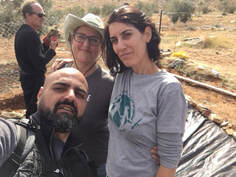 Madeleine (in hat) with Israeli and Palestinian Combatants for Peace
Madeleine (in hat) with Israeli and Palestinian Combatants for Peace
Madeleine took a brave route to leave behind old assumptions about the world and dare to look the enemy in the eye with compassion A very important step in our fractured world. Read her story:
To this day I have to remind myself that I no longer hate Vanessa Redgrave.
Well into adulthood, for me, there was something scary and suspicious about people who had sympathy for the Palestinians. Like almost 100% of us, I am a product of the story in which I grew up. Everyone has one. And most of us don’t really peep through the cracks to see what else is out there. Fast forward a few of my decades, and I began to explore this thought with my art project of ten years (listeningtotheenemy.com). It’s about putting yourself inside someone else’s story, particularly your “enemy’s,” as a pathway, perhaps, toward making war unnecessary.
In October/November 2018 I went on a “bi-narrative” tour, the first tour put together by the organization Combatants for Peace. To be honest there was a (correct) assumption that most people taking the tour would have had some substantive amount of Israeli narrative already. So the bulk of the time we found ourselves “standing in the shoes of the other,” as we spent the days seeing what an occupation of a people looks like. It is very difficult to talk about these things well without really, really knowing the history. And with all the strong stories in the air, it is hard to figure out how to learn this. But I did learn a lot. I made it a point. As I am sure is true for many long-term conflicts, the situation on the ground in Israel/Palestine is complex and laden with suppositions that are spiced with blood and sorrow and anger. So what can I say in this mere essay?
I have been thinking about what to hone in on. I will look through my lens of a visit to Yad Vashem. Yad Vashem is Israel’s face of the Holocaust: memorial and museum. I had been there 40 years ago, and I didn’t think too much of going again. This time (and it is not the same as it was, and I am not the same as I was) I was completely overwhelmed. Saying that doesn’t describe the feeling of being engulfed and overtaken by a giant wave. Room after room, we saw the systematic, insidious taking away of the rights of a people, from culture, to law, to rage to barbarity. Over and over again, from country to country in Europe - human nature diseased and turned upon itself. A horrific experience, going through. And yet, in the back of my mind this thought: If Israel can come to terms and re-present to the world this horror, how can it not see that today the Palestinians are the Jews of the Jews,* and the wheel keeps turning as it has always - the culture, the laws, the rage, the barbarity.
Something is uncovered from the ground, a shard, a bone. Ah! Thus we must make an excavation! We must protect and study this place. We must push away the people who live on this ground, as we have a mission.
We must protect ourselves in all ways. We must hold this hill so we can see danger. And we must put a wall around ourselves so we are whole. We must sustain ourselves by diverting the water, and we do not think that what water we gain from this new source, someone has lost from the old.
We must tell our children we are heroes, and they will be heroes too. We must not tell our children that we steal the air of our neighbor, so that he dies slowly and in pain. We must not tell them. This little sin of not telling is something we can live with, because after all it is the price of life.
I saw many villages and neighborhoods moved, closed down, under restriction. I saw so many of the most vulnerable in the occupied West Bank, losing the most. They have little and they lose much.
I saw two people who each live inside their own very, very strong story. And their stories are toxic, one to the other.
Now I understand that Vanessa is a hero. She looked and saw beyond, and she told us what she was seeing. It takes us so long to hear. Most of us never hear.
I hope you look up Combatants for Peace. Former Israeli and Palestinian fighters who individually came to realize that what they were doing was wrong. They each took a huge journey outside their stories to look from the other side. This small and mighty group of people are a family of their own choosing. They are astounding and I love them.
Madeleine Segall-Marx
* The Jews have long and often been the scapegoat, the singled-out people upon whom one heaps reasons to harm them. There are always reasons to accompany human rights violations - the Jews own the world, the Jews control all your money, the Jews eat your babies, and so on. Once this is "established" then it is reasonable, no?, to break the windows of their shops, to put them under curfew, to not allow them to attend schools, to move them to one spot. To shoot them. To make them disappear. This the world has long done toward the Jews, and still today in the US there is this rumble. But are the Israelis not doing this to the Palestinians? - It is their fault we must keep them behind a wall. It is always their fault. - So they are the Jews' Jews. No?
_______________________________
UPDATE #10
TAMAR HIRSCHL IN GROUP SHOW
______________________________
UPDATE #11
"CLIMATE ACTION"
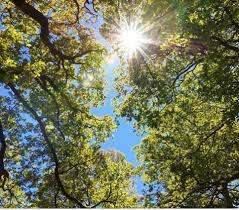 Wiki Commons
Wiki Commons
-Diane Cadena
The overriding message of this briefing is that it is imperative that we act on climate change not only because it affects us now, but because it will affect every generation to come. The focus was on families and the observance of the International Day of Families at the United Nations. Families are a common concern among us all, and we all worry about whether our families will be safe and taken care of when we are no longer here. With its emphasis on “People – Prosperity – Peace – Partnership – Planet,” this panel made it clear that we need development that can “meet the needs of the present without compromising the ability of future generations to meet their own needs.” We should always focus on prospering without harming future generations. Global climate change is a problem that has been screaming for help. The Intergovernmental Panel on Climate Change (IPCC) report spoken about by Violaine Haeringer shows that we have limited time to address it. Goal 7 is something that is vital to addressing climate change in that clean energy will help with global greenhouse gas emissions. Responsible consumption, Goal #12, is also vital. Ms. Haeringer pointed out that if our global population were to reach the projected 9.6 billion by 2050, the equivalent of almost three planets would be required to provide the natural resources needed to sustain current lifestyles. Where you shop and what you purchase can have an impact. It is important to try to reuse items and prevent constant purchasing. Due to drought and desertification, 12 million hectares are lost each year. Goal #15 concerns Life on Land. We can address this goal by supporting forest restoring efforts, going paperless, and looking for Forest Stewardship Council certification on wood and wood products.
This briefing also focused on intergenerational approaches to sustainability and various ways that families can be empowered to take climate action to achieve Sustainable Development Goal #13. Strengthening resilience and adaptive capacity to climate-related hazards and natural disasters in all countries is key. It is also crucial to integrate climate change measures into national policies, strategies and planning. We can improve education, awareness-raising and human and institutional capacity on climate change mitigation, adaptation, impact reduction and early warning. It is also crucial to implement the commitment undertaken by developed-country parties to the United Nations Framework Convention on Climate Change to a goal of mobilizing jointly $100 billion annually by 2020 from all sources to address the needs of developing countries in the context of meaningful mitigation actions and transparency on implementation, and to fully operationalize the Green Climate Fund through its capitalization as soon as possible. The briefing stressed the need to promote mechanisms for raising capacity for effective climate change-related planning and management in least developed countries and small island developing states, including focusing on women, youth and local and marginalized communities. Since the one thing we all have in common is the love and care for our families, we will need to implement the same love and care into our climate. If we do not invest the time and effort, there will not be a place in which to share that time and love with our families in the first place.
____________________________________________________________ -Yaritza Bustamante
Climate change is a topic that is very important to me, and I’m glad that the briefing on Climate Action: Focus on SDG 13” emphasized and spread awareness of the issue. One of the speakers, Steve Chiu, Representative of the Buddhist Tzu Chi Foundation, was really inspiring and outspoken. The Buddhist Compassion Relief Tzu Chi Foundation has engaged in disaster relief for years. They recognized the need for urgent climate action and trying to figure out how to prevent natural disasters from getting worse. Steve Chiu and members of the Foundation recognized that consumption and production by human beings are responsible for causing climate disasters, and Chiu pointed out what climate action should take place. He spoke out about how we should not wait for the government to make a change and take action. He maintained that once we take action and pressure the government to take action, that’s when we’ll see a huge impact.
He spoke about plastic consumption as well and how we can tackle it by reusing plastic and refusing plastic in restaurants and stores. The audience was engaged in this subject, and motivated to speak out and ask questions. One of men in the audience came from China, and he explained that years ago people around the world were so alarmed about climate change that they wanted to stop using plastic bags. He observed that the conversation seemed to have stopped suddenly, and the majority of people around the world continue to use plastic bags.
This briefing seemed to especially inspire the audience to speak out. The majority of the audience was made up of high-school students, and they were inspired to speak out and ask questions as well. It was impressive to see that they cared about climate action as much as I do. In the end, I realized that everyone in the audience was having a great time talking about climate action and climate change. The audience was encouraging each speaker and laughing at their jokes. It was enjoyable to be there with such a positive reaction from the room.
________________________________________________________
GRETA THUNBERG:
WHERE ARE THE BREAKING NEWS?
THE EXTRA NEWS BROADCASTS?
THE FRONT PAGES?
WHERE ARE THE EMERGENCY MEETINGS?
THE CRISIS SUMMITS?
WHAT COULD BE MORE IMPORTANT?
WE ARE FAILING BUT WE HAVE NOT YET FAILED.
WE CAN STILL FIX THIS.
BUT NOT IF WE CONTINUE LIKE TODAY.
NOT A CHANCE.
____________________________________________________________
The overriding message of this briefing is that it is imperative that we act on climate change not only because it affects us now, but because it will affect every generation to come. The focus was on families and the observance of the International Day of Families at the United Nations. Families are a common concern among us all, and we all worry about whether our families will be safe and taken care of when we are no longer here. With its emphasis on “People – Prosperity – Peace – Partnership – Planet,” this panel made it clear that we need development that can “meet the needs of the present without compromising the ability of future generations to meet their own needs.” We should always focus on prospering without harming future generations. Global climate change is a problem that has been screaming for help. The Intergovernmental Panel on Climate Change (IPCC) report spoken about by Violaine Haeringer shows that we have limited time to address it. Goal 7 is something that is vital to addressing climate change in that clean energy will help with global greenhouse gas emissions. Responsible consumption, Goal #12, is also vital. Ms. Haeringer pointed out that if our global population were to reach the projected 9.6 billion by 2050, the equivalent of almost three planets would be required to provide the natural resources needed to sustain current lifestyles. Where you shop and what you purchase can have an impact. It is important to try to reuse items and prevent constant purchasing. Due to drought and desertification, 12 million hectares are lost each year. Goal #15 concerns Life on Land. We can address this goal by supporting forest restoring efforts, going paperless, and looking for Forest Stewardship Council certification on wood and wood products.
This briefing also focused on intergenerational approaches to sustainability and various ways that families can be empowered to take climate action to achieve Sustainable Development Goal #13. Strengthening resilience and adaptive capacity to climate-related hazards and natural disasters in all countries is key. It is also crucial to integrate climate change measures into national policies, strategies and planning. We can improve education, awareness-raising and human and institutional capacity on climate change mitigation, adaptation, impact reduction and early warning. It is also crucial to implement the commitment undertaken by developed-country parties to the United Nations Framework Convention on Climate Change to a goal of mobilizing jointly $100 billion annually by 2020 from all sources to address the needs of developing countries in the context of meaningful mitigation actions and transparency on implementation, and to fully operationalize the Green Climate Fund through its capitalization as soon as possible. The briefing stressed the need to promote mechanisms for raising capacity for effective climate change-related planning and management in least developed countries and small island developing states, including focusing on women, youth and local and marginalized communities. Since the one thing we all have in common is the love and care for our families, we will need to implement the same love and care into our climate. If we do not invest the time and effort, there will not be a place in which to share that time and love with our families in the first place.
____________________________________________________________ -Yaritza Bustamante
Climate change is a topic that is very important to me, and I’m glad that the briefing on Climate Action: Focus on SDG 13” emphasized and spread awareness of the issue. One of the speakers, Steve Chiu, Representative of the Buddhist Tzu Chi Foundation, was really inspiring and outspoken. The Buddhist Compassion Relief Tzu Chi Foundation has engaged in disaster relief for years. They recognized the need for urgent climate action and trying to figure out how to prevent natural disasters from getting worse. Steve Chiu and members of the Foundation recognized that consumption and production by human beings are responsible for causing climate disasters, and Chiu pointed out what climate action should take place. He spoke out about how we should not wait for the government to make a change and take action. He maintained that once we take action and pressure the government to take action, that’s when we’ll see a huge impact.
He spoke about plastic consumption as well and how we can tackle it by reusing plastic and refusing plastic in restaurants and stores. The audience was engaged in this subject, and motivated to speak out and ask questions. One of men in the audience came from China, and he explained that years ago people around the world were so alarmed about climate change that they wanted to stop using plastic bags. He observed that the conversation seemed to have stopped suddenly, and the majority of people around the world continue to use plastic bags.
This briefing seemed to especially inspire the audience to speak out. The majority of the audience was made up of high-school students, and they were inspired to speak out and ask questions as well. It was impressive to see that they cared about climate action as much as I do. In the end, I realized that everyone in the audience was having a great time talking about climate action and climate change. The audience was encouraging each speaker and laughing at their jokes. It was enjoyable to be there with such a positive reaction from the room.
________________________________________________________
GRETA THUNBERG:
WHERE ARE THE BREAKING NEWS?
THE EXTRA NEWS BROADCASTS?
THE FRONT PAGES?
WHERE ARE THE EMERGENCY MEETINGS?
THE CRISIS SUMMITS?
WHAT COULD BE MORE IMPORTANT?
WE ARE FAILING BUT WE HAVE NOT YET FAILED.
WE CAN STILL FIX THIS.
BUT NOT IF WE CONTINUE LIKE TODAY.
NOT A CHANCE.
____________________________________________________________
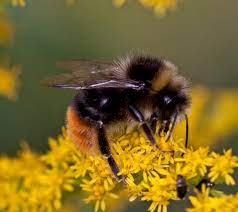 Wiki Commons
Wiki Commons
______________________________
UPDATE #12
KEBEDECH TEKLEAB is a participating artist in an important and thoughtful show
Wallach Art Gallery
Columbia University
After the End: Timing Socialism in Contemporary African Art
Opening Reception: Friday, June 14, 2019, 6–8pm
On view June 15 - October 13, 2019
After the End: Timing Socialism in Contemporary African Art presents a selection of works engaging with the history of African socialisms. It features artists looking at countries including Angola, Ethiopia, Guinea-Bissau and Mozambique. The exhibition is the first in North America to explore aesthetic responses to African socialisms and their aftermath.
Less than thirty years since independence from colonialism, the end of the Cold War brought down socialist governments and sparked a wave of upheaval among young African nations. The need to reimagine national narratives gave rise to a generation of artists that seek to make sense of the dramatic shifts witnessed by their countries.
Far from situating socialism within a fixed past, these artists complicate it through various constructions of time including nostalgia, repetition, historicism, contemporaneity and utopia. Their work investigates how temporality shapes new forms of politics, history, subjectivity and the turn to neoliberal global politics.
Participating artists:
Filipe Branquinho
Filipa César
João Costa
Ângela Ferreira
Kiluanji Kia Henda
Julie Mehretu
Nástio Mosquito
Kebedech Tekleab
Mezgebu Tesema
Yonamine
After the End: Timing Socialism in Contemporary African Art
Opening Reception: Friday, June 14, 2019, 6–8pm
On view June 15 - October 13, 2019
After the End: Timing Socialism in Contemporary African Art presents a selection of works engaging with the history of African socialisms. It features artists looking at countries including Angola, Ethiopia, Guinea-Bissau and Mozambique. The exhibition is the first in North America to explore aesthetic responses to African socialisms and their aftermath.
Less than thirty years since independence from colonialism, the end of the Cold War brought down socialist governments and sparked a wave of upheaval among young African nations. The need to reimagine national narratives gave rise to a generation of artists that seek to make sense of the dramatic shifts witnessed by their countries.
Far from situating socialism within a fixed past, these artists complicate it through various constructions of time including nostalgia, repetition, historicism, contemporaneity and utopia. Their work investigates how temporality shapes new forms of politics, history, subjectivity and the turn to neoliberal global politics.
Participating artists:
Filipe Branquinho
Filipa César
João Costa
Ângela Ferreira
Kiluanji Kia Henda
Julie Mehretu
Nástio Mosquito
Kebedech Tekleab
Mezgebu Tesema
Yonamine
______________________________
UPDATE #13
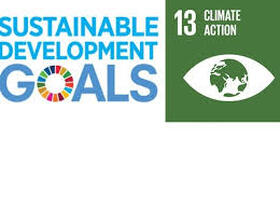
Planting and Nurturing the Seed of Climate Responsibility
Liz DiGiorgio
The Focus on Faith briefing is a regular annual feature on the NGO briefings calendar. It features an interfaith panel discussing a single global issue, and it inevitably reveals commonalities that are shared across all faiths. Attendees come away better informed, but also heartened to see how faith leaders with different religious beliefs share a common sense of purpose and a commitment to act. Jeff Brez, Chief of the Civil Society Unit, Advocacy and Special Events Section of the Department of Global Communications, pointed out that, with 85% of the world’s population belonging to a faith tradition or identifying as religious, it is necessary to engage with faith leaders and faith communities to ensure a stronger response to the climate crisis. He noted the importance of eliminating cultural and religious barriers to advance the climate narrative as part of the 2030 agenda, exploring effective communication approaches to integrating the climate conversation into religious discourse, and educating for a better understanding of climate change in the religious context.
Felipe Queipo, Information Officer and Focal Point for Faith-Based Organizations of the Civil Society Unit, moderated the discussion, and informed the audience of the upcoming climate summit scheduled by Secretary-General António Guterres for September.
The first speaker, Gopal Patel, director of an environmental initiative called the Bhumi Project, delivered a direct, heartfelt and urgent message about climate change from the Hindu perspective. He told the story of making a pilgrimage with a group of climate activists in 2015 to visit sacred sites in India that were endangered by climate change. He spoke about visiting the state of Andhra Pradesh and the town of Visakhapatnam, which had been devastated by tropical cyclone Hudhud. The cyclone caused 61 deaths and $3.5 billion in damage. Although they were touring a year after the cyclone struck, he found people who were still homeless and hungry. He noted that this experience made it clear to him that “No single person, no form of life on this planet is going to be able to escape the threat which is climate change.” He spoke about the fact that the temperature in Delhi just the day before this briefing was around 50 degrees Celsius (122°F). It is horrific to imagine the enormous danger and suffering this causes in a country where 200 million people do not have access to electricity, let alone fans and air conditioners.
Gopal Patel spoke about how individual and collective responsibility is “baked into the heart” of Hindu spirituality. He spoke about the concept of sama-darshinah or equal vision from the Baghavad Gita, and explained it as the idea that all life is sacred and equal, and that no distinction is made between men and women, humans, animals or plants. He also spoke about the principle of ahimsa or nonviolence, as the belief that “human society has a responsibility to minimize the harm and suffering that we cause on the vulnerable, the disadvantaged and on the natural world itself.” He explained the concept of “active compassion” as being an extension of the concept of ahimsa, and quoted A. C. Bhaktivedanta Swami as teaching, “Not causing violence is good, but, if people are suffering and we are in a position to help stop that suffering and don’t stop it, we are causing violence through our inaction.”
He spoke about the many Hindu organizations that have stepped up to help stop climate change, including over 60 major Hindu organizations that endorsed the 2015 Hindu Declaration on Climate Change. He discussed Hindu organizations and individuals taking the lead in climate action such as the Govardhan Ecovillage in Mumbai, Dr. Nanditha Krishna, who studies indigenous environmental practices in Chennai, the Hindu-American Foundation, the Shiva-Vishnu temple in Washington DC, and the Livermore temple in San Francisco.
Gopal Patel closed by noting that, if current trends continue, we will not meet the goals of the Paris Climate Agreement to limit temperature rise to 1.5 or 2 degrees, and that things are likely to get worse before they get better. He emphasized that in the challenging times ahead “many people are going to suffer and many people are going to die, and we will need to be there to help those people.” He also noted the need to bring “new visions and new values to help us create the institutions and societies that allow humans and the natural world to heal and to flourish.” He stressed the need to demonstrate that “business as usual cannot continue,” and that “we must push for an end to the fossil fuel era.” He maintained that the strong helping the vulnerable in this crisis was a sacred duty or dharma.
Jillian Aballe serves as the UN Advocacy Officer and Head of Office for the Anglican Communion Office at the United Nations in New York. She spoke about the extensive presence of the Anglican Communion around the world, representing 165 countries and 85 million people. She spoke about the work of the Anglican Communion, its parishes, diocese, individuals, agencies, and networks, but first outlined challenges to taking climate action that are rooted in theologies that “got us into trouble in the first place.” These include dominion theology, the idea that humans are to subdue the planet; escapist theology, the idea that we are just passing through this world; and the prosperity gospel, which encourages the idea of “riches on earth as it is in heaven.” These theologies can be seen to allow exploitation and neglect of the natural world
Jillian Aballe then described some of the climate work being done by the Anglican Church around the world, including building strong partnerships, with the UN and other partners, as well as grassroots efforts to achieve the Sustainable Development Goals. This work also includes providing relief for those suffering the effects of the climate crisis.
Ms. Aballe pointed out that earlier in the year, at the 17th session of the Anglican Consultative Council, a resolution was passed that recognized the scale of the climate emergency, and encouraged all members of the Anglican Communion to live out the Fifth Mark of Mission, “to strive to safeguard the integrity of creation and sustain and renew the life of the earth.” This call to action led to a day of public repentance, a Lenten fast for creation care, a sustainable living action plan, and resources and policies to minimize waste. The Fifth Mark of Mission has also led to an increased use of renewable energy, the incorporation of creation care into liturgies, identifying climate threats, convening strategic planning conferences, and educating about the Sustainable Development Goals (SDGs).
Ms. Aballe also described the work of the Anglican Communion Environment Network and the Anglican Alliance, an umbrella organization that fosters collaborative strategies around the world. She described recent climate work in South American and South African countries that involved work on land use and deforestation, recycling, reducing carbon footprints, organic gardening and youth organizing, and an urgent call for ecological justice. Additional projects were underway in Sri Lanka, Pakistan, India, and Malawi. Ms. Aballe also spoke about participation in the Big Shift Campaign, started by the humanitarian organization Christian Aid. As a result, 5,500 churches in the Church of England had switched to renewable energy. Ms. Aballe noted that 700 churches in England now use renewable energy such solar panels. At the UN Office the Anglican Communion Office is working on achieving the SDG’s with a focus on indigenous climate-induced displacement and small island nations.
Karenna Gore, founder of the Center for Earth Ethics at Union Theological Seminary, acknowledged that her life work is the result of a seed planted by Secretary-General Ban Ki-Moon when he convened the 2014 Climate Summit. As a result of the Summit, she organized a conference for Religions for the Earth, which brought over 200 religious leaders from around the world to Union Theological Seminary to answer the call to engage in climate action. The Center for Earth Ethics, in turn, grew out of that conference.
The theme of Ms. Gore’s presentation was the need to reorient our relationship to nature. She cited an article in the New York Times about a study in Science Advances that measured climate change in terms of lives lost. She noted that the different between 1.5 and 2 degrees of warming represents thousands of lives lost to heat waves, rising sea levels and severe storms.
Ms. Gore referenced Henrik Grape of the Church of Sweden as saying that any conversation about environmental and energy policies should have three empty chairs to represent those who have the least ability to act, but who are the most impacted: poor and vulnerable communities, future generations and other species.
Ms. Gore characterized our current moment as “a time of epic course correction.” She expressed deep appreciation for the leadership role that the UN has taken, from the 1972 UN Environmental Summit, to the Paris Agreement of 2015 and the current Sustainable Development Agenda. She stated that we also should not take for granted the leadership role that the US has had in the global community as we face “the gravest challenge that the world has ever faced.” She cited numerous threats, including the growing population, the one million species at risk of extinction, deforestation, and the rise of multi-national corporations being given greater rights in legal systems around the world.
She cited the separation of humans from nature as a root cause of our current situation, and quoted the cautionary words of Ralph Waldo Emerson:
A person will worship something – have no doubt about that. We may think our tribute is paid in secret in the dark recesses of our hearts – but it will come out. That which dominates our imaginations and our thoughts will determine our lives and character. Therefore, it behooves us to be careful about what we worship, for what we are worshiping, we are becoming.
She explained that, “In a system that elevates and reveres short-term monetary gain, no matter what the consequence for inequality, or pollution, or depletion of resources, that becomes something we worship and are becoming.” She cites the Sustainable Development Agenda as a way to correct course and to acknowledge that we are part of the “interconnected web of life.” She listed some of the work of the Center for Earth Ethics, including education, public discourse and movement-building, including indigenous traditions in an Original Caretakers Program, Environmental Justice and Civic Engagement, Sustainability and Global Affairs, an eco-ministry and an annual minister training about climate change as ways to marshal what religion has to offer to this field.
In commenting upon the idea of reserving a seat in the discussion for other species, Felipe Queipo noted that the Civil Society Unit has recently associated with the Donkey Foundation of the UK, its first NGO representing other species.
Venerable Youwang began with an explanation of the Buddhist belief that all phenomena come about through the karmic power we have generated ourselves in a continuing cycle of cause and effect, and that our lives are judged by the extent to which we are contributing to the world. This belief acknowledges our Interdependence with the environment and all sentient beings as well as a responsibility to be kind to the earth.
She talked about the importance of mobilizing young people in protecting and conserving resources, and that Buddha’s Light International (BLIA) does this through activities such as beach-cleaning , street-cleaning, charity gardening, recycling, and planting trees in order to encourage a greener lifestyle and to make a dramatic difference in the future of the earth.
She noted that all of BLIA’s locations foster humanist Buddhism and are open to all, and that her temple received a national architecture award for energy efficiency and inclusive design as an example of sustainable urbanization.
She explained that not all Buddhist are vegetarian, although monastic Buddhists are. To promote the health and environmental benefits of a meat-free diet, BLIA has been hosting vegetarian expositions since 2005. She showed a video about a program begun in 2016 called Vege-Plan, which has brought workshops about vegetarianism around the world to places such as Sidney, Australia; New York, New Jersey, and Texas in the US; as well as Toronto and Johannesburg. Venerable Youwang stated that there is no country that has not experienced the drastic effects of climate change. She acknowledged that the poorest are the most vulnerable, and that they need help to survive, recover and gain control of their future. She acknowledged that we exploit trees, water and mineral resources without thinking about future generations, and that, therefore, the responsibility “is on us.”
Tina Eonemto Stege, Climate Envoy for the Government of the Republic of the Marshall Islands began her presentation with slides and a vivid explanation of what an atoll looks like at. She noted that the Marshall Islands are, at most, 6 feet above sea level. “There is only coastline. We have lagoon and ocean and strips of land in the middle. We are essentially one long coast split among many atolls.” She recounted how she attended Mass in 2016 on Namdrick Atoll, an island with a population of only 600, and was astounded to hear a sermon about climate change by the lay preacher Isa Peter. She noted that while she had struggled to translate the climate discussion into the Marshallese Language, Isa Peter used scripture and bible stories to make climate change immediately accessible.
She recalled travelling to Namdrick years before to study grassroots community action and leadership in response to climate change. She described how in 2009 atoll leadership, including the senator, mayor, and tribal leaders adopted the whole-of-community approach to conservation and resource management planning that included leaders, landowners, youth, women’s group and men’s groups. These society-wide sectors helped to implement a mangrove protection and planting program, the creation of a marine protected area, support for pearl farming, and solar energy projects. This effort resulted in the Marshall Islands being awarded an Equator Prize in 2012 by UNDP (United Nations Development Programme).
In light of this history, Ms. Stege noted that she should not have been so surprised to hear a sermon on climate action in 2016. When she spoke to the lay preacher, Isa Peter, she learned that he had just returned from a workshop for Catholic leaders, so she had witnessed the planting and nurturing of several seeds of climate responsibility. She closed by quoting Secretary-General António Guterres as saying, “Climate change cannot be stopped by the small island countries alone. It has to be stopped by the rest of the world.”
______________________________
UPDATE # 14
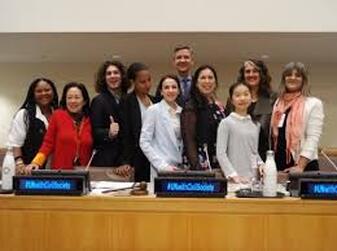 UN
UN
Bridging Sustainable Practices Across Industries:
A Focus on Food, Film, and Waste
-Yaritza Bustamante
This briefing was about waste management and recycling and how waste management and recycling can help provide jobs. The first speaker, Christina Delfico, gave us a fun fact about NASA. NASA has a waste manager for space. Human waste is a big problem in space, and this example illustrates the tremendous amount of waste we produce on earth. Christina gave examples of how countries around the work are changing their ways to keep the earth clean. For example, the UN publishes their magazines digitally now, and Sweden has a new shopping mall filled with only recycled goods. New York just banned Styrofoam and drugstores now take unused medication. I didn’t know any of these facts, and it surprised me to learn that people outside of the United States are working to help to keep the earth clean.
Another subject that I learn during this briefing was that the cast and crew of the show “Madame Secretary” is eco-friendly. In a video that was shown during the briefing, the crew members of “Madame Secretary” explained that they use compostable items, bring their own reusable water bottles, and give their leftover food to shelters. Actor Tim Daly explained that he doesn’t notice that he’s being eco-friendly anymore. He just sees it as his responsibility. I loved when he said that because it shows that anyone can change a bad habit. Speaker Erycka De Jesus explained that we should be part of our communities, connect with our neighbors and inspire each other to do better for the earth and the community. She explained you can “vote with your dollars,” meaning if you keep buying things from a company that doesn’t recycle or that uses too much plastic, you can either talk to them and explain your concerns or stop buying from them.
When it came to the question and answer period, I noticed that many of the audience members were eager to talk to the panelists, but there was one woman who stood out. She explained that a change starts with education in the community. I experienced a culture shock when I realized that not everyone is going to be able to hear about climate change and the concern for it.
________________________________________________________________________________________________________________
-Shristi Sookram
In a world where climate change is inherently becoming a larger issue, our issue, the importance of sustainability has become the center of a global conversation. I attended a UN briefing along with my peers and it was one that implanted a seed of thought deep within me, whereas it had previously been just under the surface. The briefing started out with Jeff Brez, Chief of the Civil Society, Advocacy and Special Events Section of the UN Department of Global Communications, giving a brief welcome and overview of the premise of the meeting. The speakers included: Christina Delfico, an Emmy-nominated executive producer who has been involved in several initiatives to help reduce waste and promote a more sustainable life in film and in society; Akari Tomita, an eighth grader who raises awareness within her own school (UNIS) about sustainable practices; Duygu Çelik, a Partnership Adviser at the International Fund for Agricultural Development; Claudine Marrotte, a member of the Director’s Guild of America; Max Lerner, an environmental director of the NYC Dept. of Parks and Recreation; Erycka de Jesus, who works to promote sustainability among youth; and Tama Matsuoka Wong, who promotes the message of veganism and the sustainability of a plant-based lifestyle in correlation to the welfare of the planet.
Throughout this briefing, the message of a sustainable lifestyle and what that entails became clear as its premise. As every speaker talked about their respective initiatives, I couldn't help but think about how I can impart these lessons into my own daily life. The very impressive Akari Tomita, who is an advocate in her own school, inspired me to make it a point to speak up about recycling at my job. We never used to recycle and as a company that uses massive quantities of plastics and recyclable material every day, it was important to me that we make a conscious decision to make a change. Currently we do recycle, and I am ecstatic to see what speaking up does, and that, however small the actions one takes, it always has a result. One of the speakers that enticed me the most was Tama Matsuoka Wong. She noted the importance of sustainable eating. Eating is a necessity for us, but there are so many complexities that get tangled in the back stories of our food. Wong noted the importance of preserving indigenous species and the problems of invasive weeds. She explained that there are many more types of weeds and plants that are beneficial to the human body as well as the environment other than the ones we see in the supermarket. Wong also touched on the importance and the sustainability of a vegan/plant-based lifestyle. I think it’s important to know where our food is coming from and how it reaches our table with regard to all kinds of foods, meat and dairy included. There are so many aspects within the meat and dairy industry that contribute to a rise in global warming that people rarely talk about. I love that Wong touched on that, and it really inspired me to be more conscientious about the way I eat. After all, everything in this world is connected.
______________________________
UPDATE # 15

-Shristi Sookram
I attended the “Remembering Slavery” briefing along with fellow interns and faculty mentors. This briefing highlighted the importance of historical architecture in relation to slavery. This briefing was the most informative on so many levels, and began with a speech from cultural anthropologist Sherrill D. Wilson speaking about the UNESCO site outside the United Nations building called “The Arc of Return.” It was created to mark the International Day of Remembrance of the Victims of Slavery and the Transatlantic Slave Trade. It is a present day memorial site where people can visit and learn about the history of slavery and the transatlantic slave trade.
Jacques Martial, Chairperson of Memorial ACTe (Caribbean Center for the Expression and Remembrance of Slavery and the Slave Trade) highlighted the ‘Seven Criteria for a Remembrance Site’ which included: education, urban presence, culture, symbols, spirituality, international, and participatory. These seven criteria outline a remembrance site that effectively communicates a message to the public. Martial also spoke specifically about the slave trade in Guadalupe where the conditions were inhumane.
African slaves were subjected to physical and verbal abuse and torture. Guadalupe also saw an influx of Indian indentured laborers along with African slaves. This part of the briefing connected with me in a higher way. My ancestors were also Indian indentured laborers who
were manipulated by the British and brought to the island of Trinidad in the Caribbean to work as cheap labor. It’s a part of my history that will be forever etched in generations to follow. The harsh working conditions and physical as well as cultural abuse my ancestors were subjected to is something that I feel forever indebted to them for persevering through. They preserved our culture and traditions while creating new traditions to adapt to their new environment. Slavery and the ties with indentureship are part of global history that will forever be etched into the veins of my story and millions of others. We may not have experienced it firsthand, but the echoes of it can still be heard in our lives.
Preserving and building remembrance sites that honor the victims and educate the public about the atrocities that have been inflicted upon them is essential to fully understanding the slave trade and its root causes. It is of critical importance to remember what hatred and ignorance looked like in order to dissolve it from our global community and promote a message of understanding. This briefing educated me, and it was imperative for everyone there to learn more about how to commemorate and learn from this tragic history.
______________________________
UPDATE # 16
INCREDIBLY POWERFUL
These installations are deeply moving. The potent energy of art!
These installations are deeply moving. The potent energy of art!
" NO KIDS IN CAGES"
On the streets of New York City: Art installations of lifelike children in cages with sounds of kids crying which were recorded at the border.
Idea: Badger and Winters for RAICES (Refugee and Immigrant center for Education and Legal Services)
On the streets of New York City: Art installations of lifelike children in cages with sounds of kids crying which were recorded at the border.
Idea: Badger and Winters for RAICES (Refugee and Immigrant center for Education and Legal Services)
"PINK SEESAW"
Straddling border fence between El Paso Texas and Juarez Mexico. Created by Virginia San Fratello and Ronale Rael. The architects are also planning "Burrito Wall" with a kitchen on one side and diners on both sides and"Wildlife Wall" with openings allowing animals to pass through
Straddling border fence between El Paso Texas and Juarez Mexico. Created by Virginia San Fratello and Ronale Rael. The architects are also planning "Burrito Wall" with a kitchen on one side and diners on both sides and"Wildlife Wall" with openings allowing animals to pass through
_______________________________
UPDATE #17
THE CULTURE OF PEACE
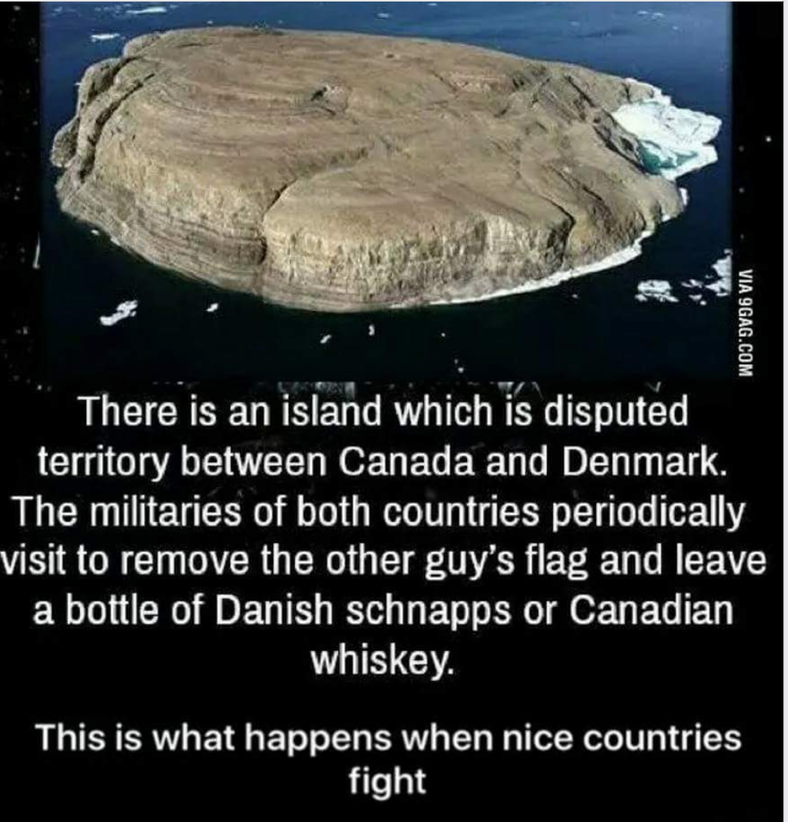
_______________________________
UPDATE #18
TAMAR HIRSCHL IN SHOW WHICH ADDRESSES A CRUCIAL ISSUE
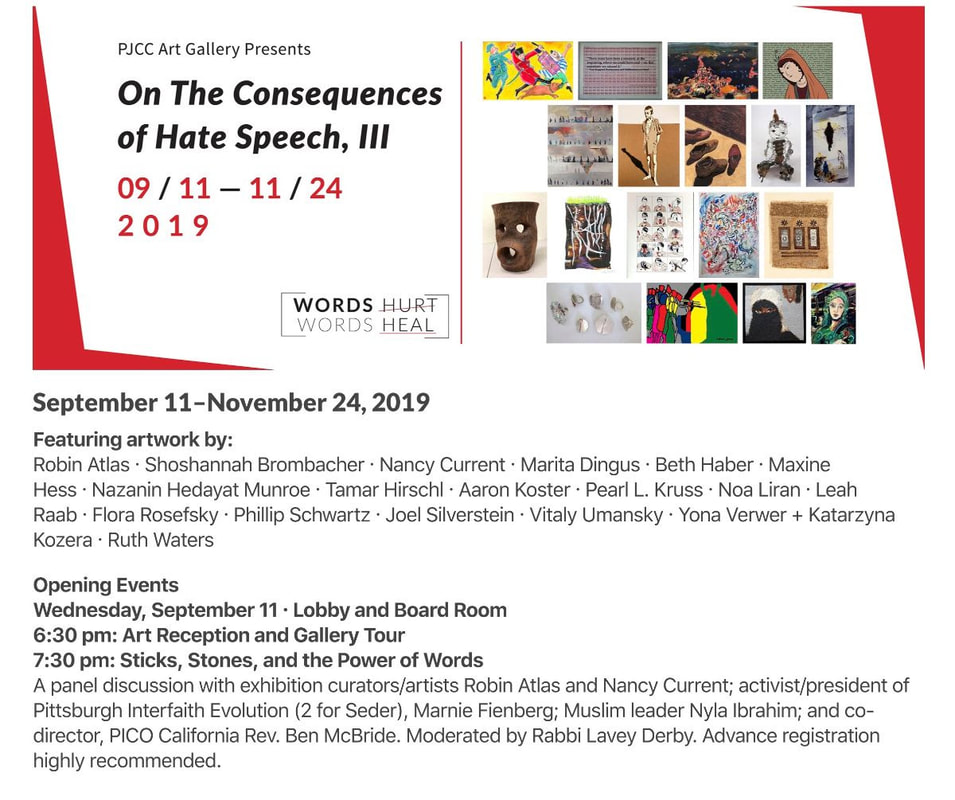
_______________________________
UPDATE #19
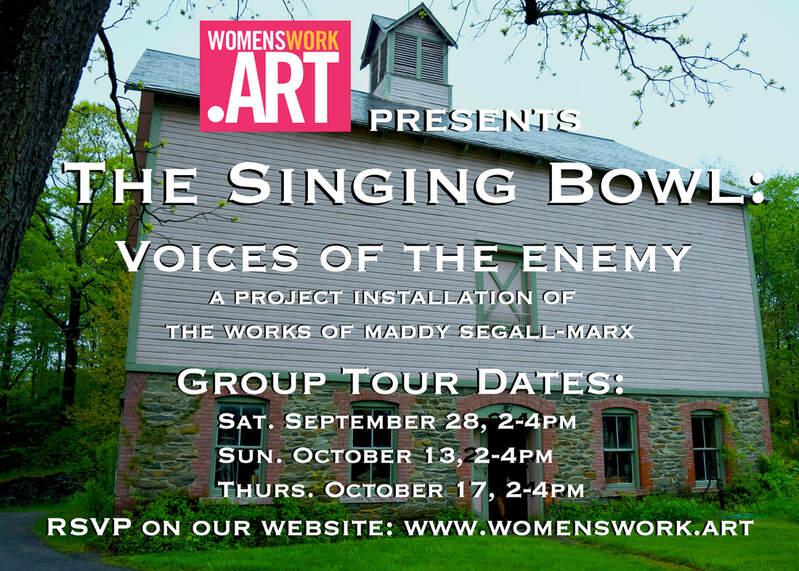
______________________________
UPDATE #20
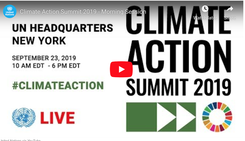
GRETA THUNBERG SPEECH AT UN CLIMATE SUMMIT
"My message is that we'll be watching you.
"This is all wrong. I shouldn't be up here. I should be back in school on the other side of the ocean. Yet you all come to us young people for hope. How dare you!
"You have stolen my dreams and my childhood with your empty words. And yet I'm one of the lucky ones. People are suffering. People are dying. Entire ecosystems are collapsing. We are in the beginning of a mass extinction, and all you can talk about is money and fairy tales of eternal economic growth. How dare you!
"For more than 30 years, the science has been crystal clear. How dare you continue to look away and come here saying that you're doing enough, when the politics and solutions needed are still nowhere in sight.
"You say you hear us and that you understand the urgency. But no matter how sad and angry I am, I do not want to believe that. Because if you really understood the situation and still kept on failing to act, then you would be evil. And that I refuse to believe.
"The popular idea of cutting our emissions in half in 10 years only gives us a 50% chance of staying below 1.5 degrees [Celsius], and the risk of setting off irreversible chain reactions beyond human control.
"Fifty percent may be acceptable to you. But those numbers do not include tipping points, most feedback loops, additional warming hidden by toxic air pollution or the aspects of equity and climate justice. They also rely on my generation sucking hundreds of billions of tons of your CO2 out of the air with technologies that barely exist.
"So a 50% risk is simply not acceptable to us — we who have to live with the consequences.
"To have a 67% chance of staying below a 1.5 degrees global temperature rise – the best odds given by the [Intergovernmental Panel on Climate Change] – the world had 420 gigatons of CO2 left to emit back on Jan. 1st, 2018. Today that figure is already down to less than 350 gigatons.
"How dare you pretend that this can be solved with just 'business as usual' and some technical solutions? With today's emissions levels, that remaining CO2 budget will be entirely gone within less than 8 1/2 years.
"There will not be any solutions or plans presented in line with these figures here today, because these numbers are too uncomfortable. And you are still not mature enough to tell it like it is.
"You are failing us. But the young people are starting to understand your betrayal. The eyes of all future generations are upon you. And if you choose to fail us, I say: We will never forgive you.
"We will not let you get away with this. Right here, right now is where we draw the line. The world is waking up. And change is coming, whether you like it or not.
"Thank you."
"My message is that we'll be watching you.
"This is all wrong. I shouldn't be up here. I should be back in school on the other side of the ocean. Yet you all come to us young people for hope. How dare you!
"You have stolen my dreams and my childhood with your empty words. And yet I'm one of the lucky ones. People are suffering. People are dying. Entire ecosystems are collapsing. We are in the beginning of a mass extinction, and all you can talk about is money and fairy tales of eternal economic growth. How dare you!
"For more than 30 years, the science has been crystal clear. How dare you continue to look away and come here saying that you're doing enough, when the politics and solutions needed are still nowhere in sight.
"You say you hear us and that you understand the urgency. But no matter how sad and angry I am, I do not want to believe that. Because if you really understood the situation and still kept on failing to act, then you would be evil. And that I refuse to believe.
"The popular idea of cutting our emissions in half in 10 years only gives us a 50% chance of staying below 1.5 degrees [Celsius], and the risk of setting off irreversible chain reactions beyond human control.
"Fifty percent may be acceptable to you. But those numbers do not include tipping points, most feedback loops, additional warming hidden by toxic air pollution or the aspects of equity and climate justice. They also rely on my generation sucking hundreds of billions of tons of your CO2 out of the air with technologies that barely exist.
"So a 50% risk is simply not acceptable to us — we who have to live with the consequences.
"To have a 67% chance of staying below a 1.5 degrees global temperature rise – the best odds given by the [Intergovernmental Panel on Climate Change] – the world had 420 gigatons of CO2 left to emit back on Jan. 1st, 2018. Today that figure is already down to less than 350 gigatons.
"How dare you pretend that this can be solved with just 'business as usual' and some technical solutions? With today's emissions levels, that remaining CO2 budget will be entirely gone within less than 8 1/2 years.
"There will not be any solutions or plans presented in line with these figures here today, because these numbers are too uncomfortable. And you are still not mature enough to tell it like it is.
"You are failing us. But the young people are starting to understand your betrayal. The eyes of all future generations are upon you. And if you choose to fail us, I say: We will never forgive you.
"We will not let you get away with this. Right here, right now is where we draw the line. The world is waking up. And change is coming, whether you like it or not.
"Thank you."
_______________________________
UPDATE #21
Trump gave predictable speech at the UN General Assembly which mocked globalism, praised nationalism, and was strongly anti-immigration.
_______________________________
UPDATE #22
Sign in NYC subway during UN Week:
_______________________________
UPDATE #23
OCTOBER 12 -- WORLD MIGRATORY BIRD DAY
OCTOBER 14 -- INDIGENOUS PEOPLES DAY
_______________________________
UPDATE #24
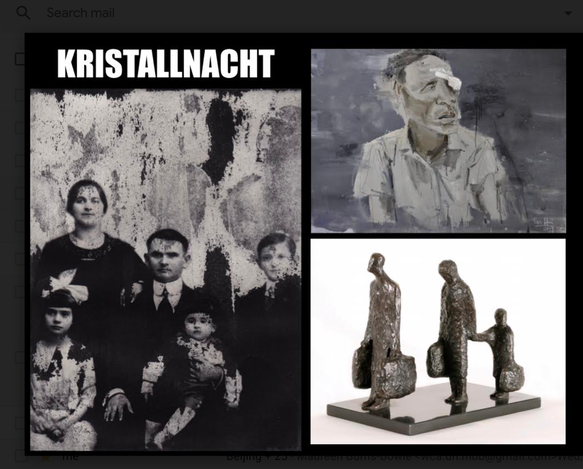
Simone Kestlemen Presents:
SK Art Gallery will present Kristallnacht, an exhibit to make witness to hatred and to ensure it never happens again. Kristallnacht, meaning the “Night of Broken Glass” occurred in Germany in 1938 on Nov. 9th & 10th. Today across the globe, we see global, rampant outbursts of hate and fear toward our fellow humans. Values of freedom, love and compassion towards our neighbors in need are being surpassed by oppression of race, social cast, ethnicity, gender and religion. This exhibit asks us to be vigilant and stand up against oppression and hatred of any kind.
Kristallnacht owes its name to the shards of shattered glass that lined German streets in the wake of the Nazis supporters who had torched synagogues, vandalized Jewish homes, schools and businesses destroyed during the violence. It also marked the turning point from Jewish oppression by the Nazis to the violence and destruction of the Jewish European population. We remember Kristallnacht, the Night of Broken Glass as a remembrance to stand up for what is good and morally right for everyone to live in a world of Love.
Simone Kestelman established SK Art Gallery NY in White Plains in June 2016 to provide a space to create original work inspired from shared social issues worldwide. Her goal is to help aspiring artists by providing space to create and showcase their work. She wants to provide artistic opportunities and knowledge that she lacked growing up.
SK Art Gallery will present Kristallnacht, an exhibit to make witness to hatred and to ensure it never happens again. Kristallnacht, meaning the “Night of Broken Glass” occurred in Germany in 1938 on Nov. 9th & 10th. Today across the globe, we see global, rampant outbursts of hate and fear toward our fellow humans. Values of freedom, love and compassion towards our neighbors in need are being surpassed by oppression of race, social cast, ethnicity, gender and religion. This exhibit asks us to be vigilant and stand up against oppression and hatred of any kind.
Kristallnacht owes its name to the shards of shattered glass that lined German streets in the wake of the Nazis supporters who had torched synagogues, vandalized Jewish homes, schools and businesses destroyed during the violence. It also marked the turning point from Jewish oppression by the Nazis to the violence and destruction of the Jewish European population. We remember Kristallnacht, the Night of Broken Glass as a remembrance to stand up for what is good and morally right for everyone to live in a world of Love.
Simone Kestelman established SK Art Gallery NY in White Plains in June 2016 to provide a space to create original work inspired from shared social issues worldwide. Her goal is to help aspiring artists by providing space to create and showcase their work. She wants to provide artistic opportunities and knowledge that she lacked growing up.
_______________________________
UPDATE #25
Marcia Annenberg at Ceres Gallery, NYC
